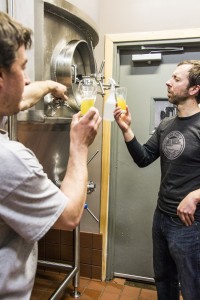NMU alumnus Adam Robarge, formerly running for a state senate seat on the Democratic ticket, withdrew his candidacy to run for Marquette city commission, saying he wants to explore his options in local politics.

Watching what Robarge calls “political apathy” seep into civics, the 38-year-old hopes to catalyze greater community engagement.“I’m just trying to find my place in the sphere of things,” Robarge said. “I can’t find out unless I explore it.”
Benjamin Bohnsack, chairman of the Marquette County Democratic Party, acknowledges incumbent Senator Tom Casperson’s political influence will be a challenge to his Democratic opponent, whoever that will be.
“Anyone who takes on the present senator will have a very hard time on their hands,” Bohnsack said. “You have to have strong public appeal and you have to have substance.” Running for senate was an ambitious undertaking and Robarge found that more time was dedicated to public relations than policy.
“I had no time to look at policy,” Robarge said. “I was being told ‘You need to be focused on getting people to like you right now, policy comes later.’ But these people are already informed and they’re asking questions that need to be answered.
“People have [a] view of where the future should go, but the people who are creating policy don’t share that view. For me, I think it’s time to get people in that position who share the same viewpoint.”
Conservation informs Robarge’s politics, which is partly why he chose to run for Senate in the first place. Casperson came under criticism from environmentalists a year ago when he introduced Senate Bill 79, which prohibited the Department of Natural Resources from designating land for biological diversity and removed biodiversity from the bureau’s management duties, and it was passed by the legislature and signed by Gov. Snyder.
Robarge, who graduated in 2011 with an earth science degree and minors in history and biology, was heavily influenced by the late earth, environmental and geographic sciences professor John Anderton. Anderton was committed to conservation in his research, inspiring Robarge to prioritize the environment in his private and professional life.
“We’re headed to an unknown point where there are some major obstacles in our way and we’re not going to handle them by being separate from each other. Place building, social capital, those ideas really interest me,” Robarge said. “Creating green spaces, preserving green spaces that we have, but also promoting recreation opportunities. Coordinating that along with some education about the landscape…helping [people] understand the areas they’re recreating in.”
Robarge’s economic views emphasize community building and accessibility.
“It’s about having a good lifestyle and being comfortable enough so that you can explore your options and not be financially burdened,” Robarge said. “Creating a livable life. Creating a community where all individuals can find themselves and [have] opportunities to explore themselves. You don’t want to build up a community that has all these wonderful amenities which creates very livable spaces, but that aren’t accessible to everyone. You have to be able to recognize where those barriers exist and be able to break them down.”
Robarge’s vision is influenced by his fondness for geography, even symbolically.
“I really like this metaphor of building a map. We need a map of where we want to go,” Robarge said. “What do you think needs to happen for you to stay here and have children [who] stay here. We need to create a future of sustainability. Sustainability means being prosperous over the long term. That’s what we’re all in this for, whether it’s housing, economy, recreation, environment, sustainability is the goal. That takes forward thinking, it takes a vision and open mindedness. That’s really what most members of the community, most people of this country are looking for.”
Megan Keith, president elect of NMU College Democrats, has faith in Robarge’s environmental insights.
“One of the main focuses for the [Upper Peninsula] is balancing our extractive and tourist industries,” Keith said. “The problem with a lot of extractive industries is that they’re short term. It’s important that we keep the eco-tourism side. Adam knows a lot about that.”
Robarge roots his civic engagement in a desire to see a stronger grass-roots democracy. For the candidate, his bid for city commission compliments that desire.
“I think for me it was wanting to be part of this movement, it sounds cliché, but the government of the people,” Robarge said. “Demonstrating that you can make a difference and what you need to do is constantly be aware and on the path to where you can make a difference. That’s what I’m searching for right now.”
























